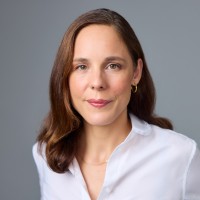Anita Anthonj moved from Germany to New York twenty years ago to pursue a career in theater and film. In her late twenties, she discovered her true calling lay beyond the stage: “I like to call my own shots. So instead, I became a producer,” she told us. For years, she worked for RTL Group, producing news content, documentaries, and other pet projects on the side.
Today, Anita is a successful entrepreneur, co-founder and CEO of Talaera, a company providing corporate English and culture training for non-native English speakers, and a mother of two.
We wanted to find out how she balances these different, yet very demanding roles in her life.
This interview with Anita Anthonj is part of the latest CAKE.com campaign aimed at understanding the needs and experiences of women in business. We handpicked successful women CEOs to help us explore the challenges female founders face, and how they balance their work and personal commitments.
- In 2016, Anita founded Talaera, a company providing corporate English online courses for non-native English speakers.
- Anthonj believes the position of women in business is better than in the past, but still far from genuine equality.
- Success in gender equality depends on collaboration, with men and women working together to break barriers and drive change.
On starting a company
In 2016, Anita Anthonj and her husband identified a significant gap in the language learning market. Plenty of platforms helped people practice English, but few addressed the deeper cultural aspects of communication that are essential for success in professional environments.
Anita and her husband found the idea of combining language learning and culture training interesting for two reasons:

“As a foreigner in the US, I was fluent in English but struggled to connect on a deeper level in business settings. I also noticed others experiencing the same challenges — brilliant professionals with strong academic credentials who struggled to thrive due to communication barriers.”
This realization inspired the creation of Talaera, combining language learning with cultural training to address these deeper needs. Extensive research, including a trip to Korea to study corporate English training trends, shaped the platform’s innovative approach.
But, starting and developing a business is a bumpy road.

“Everybody tells you it’s going to be hard, but it’s so much harder than you expect.”
One of the biggest challenges is the uncertainty:

“I think we sometimes get very hung up on thinking too much or worrying about what can go wrong instead of just doing it. In addition, I am very detail-oriented, therefore sometimes I lose sight of the bigger picture.”
She also says women founders are sometimes taken less seriously — like their business is more of a hobby.
Breaking barriers in fundraising
According to the Women Who Tech 2023 survey, 70% of female founders experienced differential treatment while raising funds for their business, and 65% “were told they would raise more money if they were a man”. Anita encountered biases firsthand.

“Firstly, only 2% or less of venture funding goes to women-founded startups in the US. Therefore, it is hard to get the capital to begin with.
I also think so many of the deals are done not on the pitch, but in some kind of informal atmosphere. It’s so much harder for women to get into that community.
Moreover, I am the CEO, but the co-founder of my company is male, and sometimes the conversations would be directed at him. I even had two VCs ask if my co-founder could take over as CEO if we got funded.”
Further reading:
Are you interested in learning more about unconscious biases? Here’s how unconscious biases impact a workplace and how to avoid them:
Despite being hard, fundraising is essential when building a start-up. Anita’s advice to women entrepreneurs is to overprepare for every meeting:

“Take control of the conversation, and don’t hesitate to reach out to other female founders for insights and support.”
For Anita, good preparation is key for all kinds of meetings, especially when you’re a non-native English speaker.

“When I have an important meeting, I overprepare. I walk through the situation over and over again to be sure I’ve got everything covered.”
On balancing business and family
In addition to leading a team across multiple time zones, Anita is a mother of two. Balancing these roles is quite challenging. In one podcast where she was a guest, she said she often feels like a “constant failure”:

“I think I have very high expectations for myself and those around me. But I also compartmentalize a lot. When I work, I work, when I’m with my children, I don’t think of anything else.
I sometimes feel like I don’t give an adequate amount of time to my kids. But when you run a business and have children, something’s got to give. And a lot of times I feel like I failed everyone because you’re trying to do everything right and it’s just not always possible.”
Further reading:
If you feel like your achievements are the result of luck, not your talent and hard work, you might have imposter syndrome. Learn how you can overcome it:
At one point, she realized that she put too much pressure on herself:

“You have to give yourself grace for what you’ve done. And I realized I needed to take space. I don’t work on the weekends and holidays anymore. I also became very mindful of the things that bring me joy, like spending time with my children or friends, or seeing a play.”
Anita also stresses the importance of family support. Success in gender equality depends on collaboration, with men and women working together to break barriers and drive change:

“Support from my husband has been invaluable. We share responsibilities equally, and his involvement allows me to dedicate time to both my business and my family. My dad was a single father, he also ran a company, but he was always present. We need more men like my dad and my husband.”
Further reading:
Are you interested in reading about gender inequality in household work? Check out our study:
Anita is also committed to fostering a supportive workplace culture at Talaera, with policies like flexible hours and parental leave, to accommodate diverse employee needs:

“Hopefully, in the future, we will be able to support them even more.”
Further reading:
The US federal law doesn’t require employers to provide paid maternity leave. Read about the maternity leave laws in different states:
On gender inequality and the position of women in society
Women’s position in society is moving in the right direction, but it is far from the place it should be, Anita says:

“My grandma wanted to be a doctor, but she never got the chance to do that. I feel lucky because I got to do everything I wanted. However, I still think men and women get different opportunities. It’s harder for women to break into certain leadership circles, for example. And when I find myself in a predominantly male setting, I sometimes find it very hard to manage and communicate effectively.”
Anita says she feels lucky to be able to live the way she wants and doesn’t feel like she’s being held back as a woman. But she also notes it is more of a privilege than a ‘status quo.’
Parting message: Don’t dim your light
For aspiring entrepreneurs, Anita’s advice is clear:

“Don’t overthink it. If you see a gap in the market, take action. Do your research, connect with other founders, and ask for help.”
But most importantly, Anita says, believe in yourself:

“Don’t tell yourself you’re not good enough. Don’t dim your own light. If you want to do something, go for it, because you can do it.”
This interview is part of CAKE.com’s latest Women in Tech campaign. Stay tuned for more female CEO insights. And, on February 11, check out our comprehensive Women in Tech study exploring the challenges and experiences of women in tech.
How we reviewed this post: Our writers & editors monitor the posts and update them when new information becomes available, to keep them fresh and relevant.



